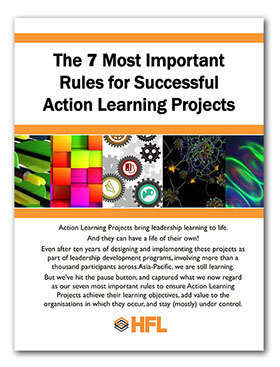Action learning is a highly recommended addition to all HFL leadership program designs. Action learning is where participants on a program are required to put directly into practice skills that they have learned, either in a facilitated workshop style session, or as a distinct project set outside workshop time. Participants are given real tasks to perform, clear mandates and deadlines, and are required to formally report back on (a) project outcomes and (b) learning outcomes.
Action learning provides an opportunity for practical skills application, increasing business knowledge and teamwork skills. It helps participants embed new behaviours, skills and knowledge; and it also allows participants to practise activities that might not normally be part of their existing role. The latter is particularly useful when the leadership program is aiming to develop readiness for promotion. As in all learning, by actually doing the activity learning is enhanced, knowledge gaps or misunderstandings identified, and even making mistakes solidifies learning and acts as a catalyst for further practice and mastery.
Designing effective action learning is not easy; indeed, planning, design and execution is at the very least as complex as designing a full workshop, and is often more so. Key insight: Don’t make the mistake of thinking action learning projects can be quickly added into a program.
Special note: Research conducted by HFL among participants in action learning projects found that:
-
75% of participants find action learning projects challenging and engaging, enjoying the chance to work with other people, and increasing their leadership and communication skills, self management, creative thinking and self awareness.
-
On reflection 74% considered the time invested worthwhile and would recommend action learning projects to others, although they were slightly more reluctant to engage in another project in the short term.
-
Ideally they would welcome an equal focus on learning and task, versus task over learning preference. A number of other personal learning results were also achieved by participants.
HFL has been designing and delivering action learning in all its various forms (including business simulations and complex multi-stage role plays) for many years, and has over this time built up our Ten Golden Rules on executing Action Learning. These rules assist our consulting team and our clients making some critical mistakes than often hamper the desired outcomes of action learning.
Some highlights include:
-
It is extremely important to clearly define the business issue that will be addressed by the project team – but broadly (give them some space); what is important to the organisation now, or what will be in the near future?
-
The learning needs of the group have to be clearly established and aligned with the project; what do the participants most need to learn, and does this project provide the opportunity? Key insight: In poorly designed action learning, there is lots of action but very little learning.
-
The committed engagement of senior leaders is also a key to success; but getting the right engagement in the right way takes time, effort, communication, and excellent briefing.
HFL has undertaken a range of action learning projects for clients, including emerging leaders, change managers, executive teams, and general managers.
If you would like to obtain a copy of our 7 Golden Rules For Successful Action Learning Projects , use the download form.




